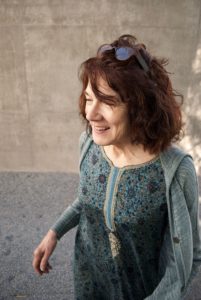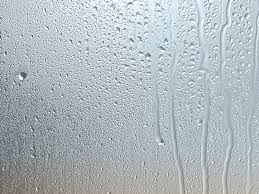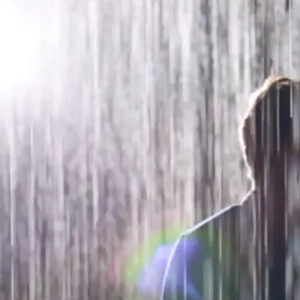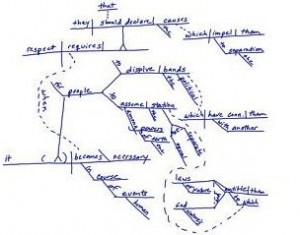 It seems to me that Mary Ruefle, one of my very favorite poets, has perfectly captured something in this poem, though it would be hard for me to articulate exactly what. Perhaps you will experience that, too (photo of Mary by Hannah Ensor):
It seems to me that Mary Ruefle, one of my very favorite poets, has perfectly captured something in this poem, though it would be hard for me to articulate exactly what. Perhaps you will experience that, too (photo of Mary by Hannah Ensor):
The Bench
My husband and I were arguing about a bench we wanted to buy and put in part of our backyard, a part which is actually a meadow of sorts, a half-acre with tall grasses and weeds and the occasional wildflower because we do not mow it but leave it scrubby and unkempt. This bench would hardly ever be used and in the summer when the grasses were high would remain partially hidden from view. We both knew we wanted the bench to be made of teak so that it would last a long time in the harsh weather and so that we would never have to paint it. Teak weathers to a soft silver that might, in November or March, disappear into the gray hills that are the backdrop of our lives. My husband wanted a four foot bench and I wanted a five foot bench. This is what we argued about. My husband insisted that a four foot bench was all we needed, since no more than two people (presumably ourselves) would ever sit on it at the same time. I felt his reasoning was not only beside the point but missed it entirely; I said what mattered most to me was the idea of the bench, the look of it there, to be gazed at with only the vaguest notion it could hold more people than would ever actually sit down. The life of the bench in my imagination was more important than any practical function the bench might serve. After all, I argued, we wanted a bench so that we could look at it, so that we could imagine sitting on it, so that, unexpectedly, a bird might sit on it, or fallen leaves, or inches of snow, and the longer the bench, the greater the expanse of that plank, the more it matched its true function, which was imaginary. My husband mentioned money and I said that I was happier to have no bench at all, which would cost nothing, than to have a four foot bench, which would be expensive. I said that having no bench at all was closer to the five foot bench than the four foot bench because having no bench served the imagination in similar ways, and so not having a bench became an option in our argument, became a third bench. We grew very tired of discussing the three benches and for a day we rested from our argument. During this day I had many things to do and many of them involved my driving past other houses, none of which had benches, that is they each had the third bench, and as I drove past the other houses I could see a bench here and a bench there; sometimes I saw the bench very close to the house, against a wall or on a porch, and sometimes I saw the bench under a tree or in the open grass, cut or uncut, and once I saw the bench at the end of the driveway, blocking the road. Always it was a five foot bench that I saw, a long sleek bench or a broken-down bench, a bench with a slatted back or a bench with a solid, carved back, and always the bench was empty. But I knew that for my husband the third bench was only four feet long and he saw always two people sitting on it, two happy or tired people, two people who were happy to be alive or two people tired from having worked hard enough to buy the bench they were sitting on. Or they were happy and tired, happy to have reached the end of some argument, tired from having had it. For these people, the bench was an emblem of their days, which were fruitful because their suffering had come to an end. On my bench, which was always empty, nothing had come to an end because nothing had begun, no one had sat down, though the bench was always there waiting for exactly that to happen. And the bench was always long enough so that someone, if he desired to, could lie all the way down. That day passed. Another day followed it and my husband and I began, once more, to discuss the bench. The sound of our voices revealed a renewed interest and vigor. I thought I sensed in him a coming around to my view of the bench and I know he sensed in me a coming around to his view of the bench, because at one point I said that a four foot bench reminded me of rough notes towards a real bench while a five foot bench was like a fragment of an even longer bench and I admitted it was at times hard to tell the difference. He said he didn’t know anything about the difference between rough notes and fragments but he agreed that between the two benches there was, possibly, just perhaps — he could imagine it — very little difference. It was, after all, only a foot we were talking about. And I think it was then, in both of our minds, that a fourth bench came into being, a bench that was only a foot long, a miniature bench, a bench we could build ourselves, though of course we did not. This seemed to be, essentially, the bench we were talking about. Much later, when the birds came back, or the leaves drifted downwards, or the snow fell, slowly and lightly at first, then heavier and faster, it was this bench that we both saw when we looked out the window at the bench we eventually placed in the meadow which continued to grow as if there were no bench at all.
Mary Ruefle, from The Most of It

 It’s like Christmas morning when new chicks arrive. I ordered a new breed, called Cukoo Bluebars, in February, and Tuesday morning, five baby chicks arrived, shipped USPS overnight from Ohio.
It’s like Christmas morning when new chicks arrive. I ordered a new breed, called Cukoo Bluebars, in February, and Tuesday morning, five baby chicks arrived, shipped USPS overnight from Ohio.


